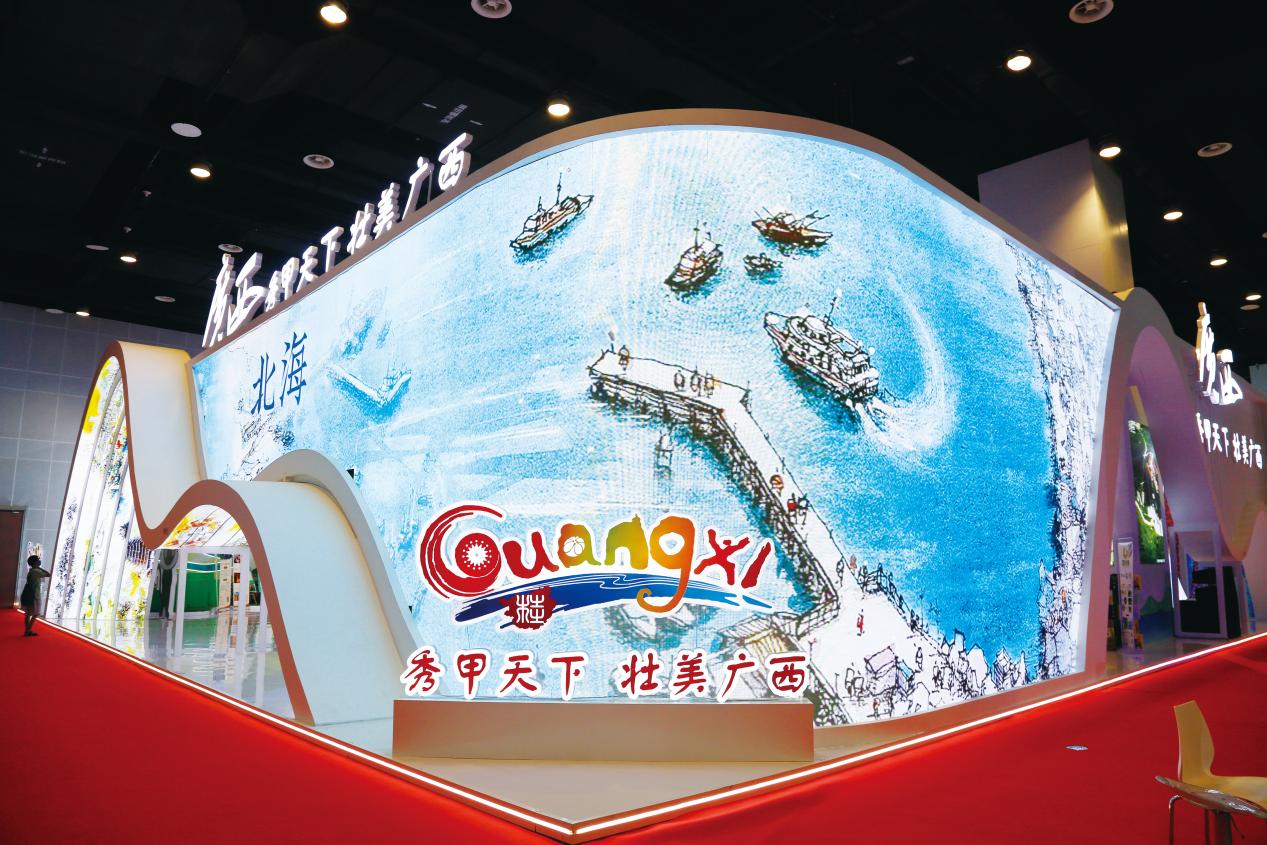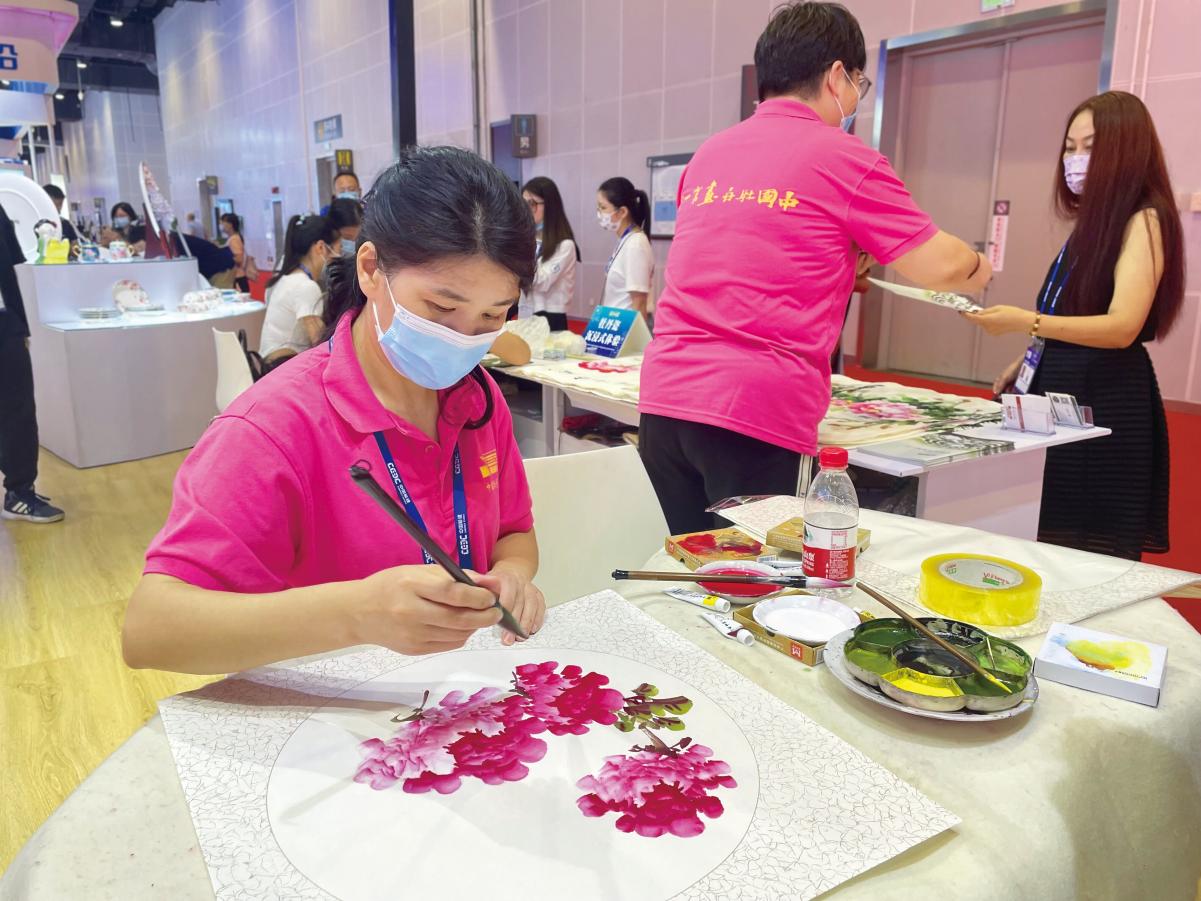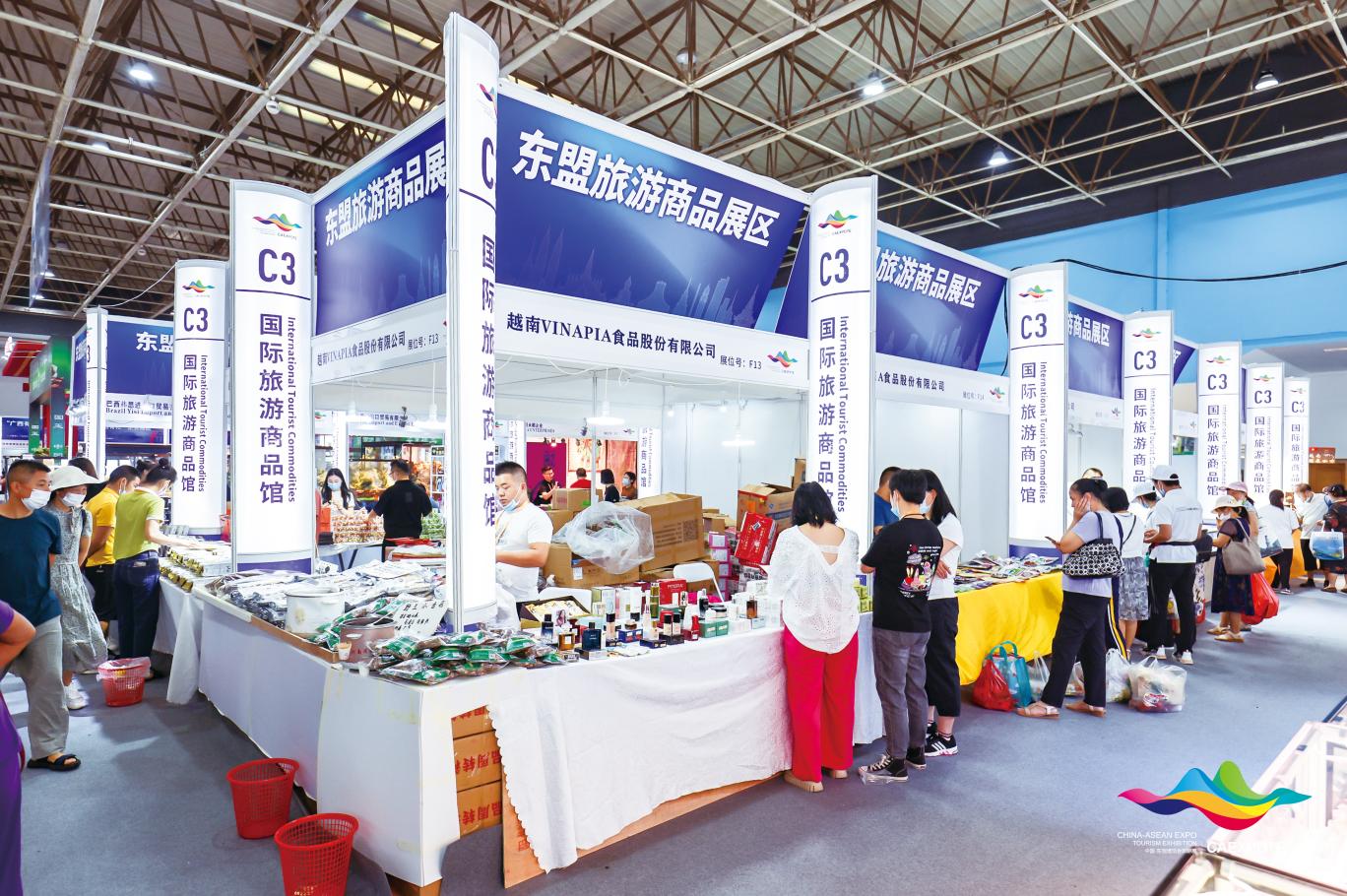

Written by Li Hongting / Translated by Wei yingling
At the Wu Xiang Automobile Plaza exhibition area in the 19th China-ASEAN Expo (CAEXPO), an SUV painted with colorful graffiti is parked on the green space with its roof tent. Around the car, outdoor tables and chairs, barbecue grills, and storage boxes are scattered for visitors to rest or take social media shots. With their chats and laughter, a vivid and lively picture of camping in the wild is presented. Walking into the displayed hotel beside the SUV and looking up into the panoramic skylight, one will have the impulse to start a journey.
As a bridge for connecting China and ASEAN countries, the 19th CAEXPO has for the first time set up an exhibition area for culture, tourism, and health care to bring this “sunrise industry” to the public, providing a new platform for the integration and innovative development of China-ASEAN culture, tourism, and health care industries and outlining a picture of China-ASEAN green tourism with the connotation of “poetry and distance”.

Sunrise industry gets off to a flying start at the CAEXPO
As the Chinese government is promoting the “Outline of the Healthy China 2030 Plan” in an all-round way, China has entered the era of comprehensive health. The “culture and tourism + health care” mode of innovation, integration, and relaxation, with culture as orientation, tourism as the main body, wellness as support, and health as highlight, has provided new options for people to enrich their extracurricular life. Such a mode possesses a bright market prospect, a wide growing space, and strong development momentum.
The 19th CAEXPO features the idea of “poetry and distance” in its first culture, tourism, and health care exhibition, where many projects in the culture and tourism industry were displayed, including tourism accommodation, leisure equipment and supplies, and health tourism demonstration bases, providing visitors with an immersive experience of urban camping and traveling. Everything mentioned above is
just a part of the exhibition.
So far, both China and ASEAN are seeing rapid economic growth. With rising living standards, people switch towards a more leisurely lifestyle. Some consumers who are “rich, leisurely, healthy, and self-aware” will choose to take care of their health through spending vacation, just like “migratory birds.” Doubled with the demand for traveling not being met during the pandemic, the form of “health + tourism” has become a common and ongoing hotspot. In addition, building a “Healthy China” has become China’s national strategy. According to the “Outline of the Healthy China 2030 Plan,” the market scale of China’s health business will reach 16 trillion yuan by 2030. As the key driver to put the “Health China” strategy into practice, health care is gathering interest. “culture and tourism + health care”, the new format of highend tourism and leisurely vacations is growing as a “sunrise industry” and an special tourism product with promising prospects and popular among tourists.
The culture, tourism, and health care industry in ASEAN countries has got ahead of Asia and even the world. After the normalization of cross-border travel in the wake of the pandemic, the culture, tourism, and health care industry in China-ASEAN saw greater chances for growth. As an important platform for fostering mutual political trust, economic and trade cooperation, and cultural and people-to-people exchanges between China and ASEAN, the 19th CAEXPO capitalized on the new era’s development opportunities to establish a culture, tourism, and health care exhibition, thereby advancing the development of China-ASEAN tourism. It boosts the gathering of high-quality tourism products in China and ASEAN countries and the development of the China-ASEAN region’s big health and culture and tourism industry towards green ecology, health, intelligence, and integrated innovation.

Mutual promotion for a shared future of the industry
China and ASEAN countries have always been major tourism destinations and tourist markets for each other. Tourism exchanges and cooperation serve as the cultural bond and financial support for the two peoples in pursuit of a better life. For culture, tourism, and health care industries continue to gain long-run development, both sides should build on distinctive local features, get nourishment from local culture, and learn from each other.
Thailand’s health care sector acts as a model for other ASEAN nations. You Jianwei, CEO of Bumrungrad International Hospital China Referral Office, stated that Thailand’s health care industry emerged after its financial crisis. The country has re-positioned its health industry and would in a fiveyear cycle formulate its development plans which involve various aspects such as government coordination, industry planning, manufacturing of related products, and the creation of wellness cultivation atmosphere. Favorable toplevel policies have provided substantial support for the growth of the industry.
In addition, Thailand has a well-developed culture of wellness cultivation. Powered constantly by its specialized medical care education system, Thailand has ranked among the world’s best countries for health care services. Besides, owing to its low price and people’s friendliness, Thailand is becoming an increasingly popular spot for wellness tourism.
The vastness and distinctive natural environment for wellness cultivation, such as seashore, forest, grassland, and lakeside, have given birth to various local customs and diet characteristics. As the only region connected with ASEAN countries by land and sea and with particularly favourable natural conditions, Guangxi is uniquely positioned to develop culture, tourism, and health industry. First of all, Guangxi has precious ecological advantages, agricultural resources, colorful minority customs, deep and profound history and cultures. In 2021, seven cities in Guangxi, namely Guilin, Nanning, Beihai, Wuzhou, Fangchenggang, Liuzhou, and Yulin, were listed in China’s top 100 tourism cities for health care. Guangxi is also rich in Chinese medicine resources. Bama Yao Autonomous County develops wellness cultivation tourism based on Guangxi’s distinctive medicine culture of Zhuang and Yao, positioning itself in the mass market. Its rural tourism business has contributed significantly to the revitalization of rural areas in Guangxi and the building of a world-known longevity and relaxation resort.
Secondly, sports business integrated with tourism, culture, and health care industries has become a new growth point in local economy. Guangxi has been maintaining close cooperation and exchanges with ASEAN countries in culture and sports. The first “Belt and Road” International Regatta which was successfully held by Guangxi in 2019 has been widely recognized by countries along the “Belt and Road” and even by the international community. It has become a crucial base for Guangxi to establish a regional sports event center facing ASEAN, and as a result, the sports and health care sectors of both Guangxi and ASEAN have obtained development opportunities.
At the 19th CAEXPO in 2022, Guangxi’s culture and tourism exhibition used digital multimedia technology to display its 14 cities’ cultural and tourism features by scrolling them on a large electronic screen, capturing attention from visitors. In the exhibition area, six brands are displayed, namely the “Guilin Landscape”, “Romantic Beibu Gulf”, “Splendid Borderline”, “Longevity Guangxi”, “Traditional Sanyuesan Festival”, and “The Culture of Liu Sanjie”. All of them display landscape scenery, wellness tourism, border customs experience, leisurely coastal holiday, ethnic culture tourism, cultural and artistic products, and other special culture and tourism contents. More than 200 unique cultural and tourism exhibits of Guangxi are also showcased in the exhibition, including Zhuang brocade, Qinzhou Nixing pottery, and Liuzhou bauhinia series that include intangible cultural heritage specialties and ethnic crafts. By utilizing CAEXPO’s platform function, Guangxi once again makes efforts to make its own culture, tourism, and health care brand known to the world.

Culture, tourism, and health care to empower all walks of life
In recent years, China and ASEAN countries have actively promoted the construction of bilateral and multilateral ChinaASEAN culture and tourism cooperation mechanisms under the framework of the “Belt and Road” Initiative. The expanding culture and tourism cooperation between China and ASEAN has become an important pillar of China-ASEAN relations.
Tourism is a comprehensive and highly-interrelated industry. As a new mode of economic breakthrough in the new era, “culture and tourism + health care” will undoubtedly achieve cross-industry integration in many fields. For example, the combination of wellness tourism with the secondary industry will empower the development of real estate and equipment in this field; the combination with ecology will drive the development of green and organic agricultural products planting and rural ecological tourism; the combination with the Internet industry will promote the generation of new technologies related to intelligent elderly care, intelligent communities, simulated scenario experiences, tourism electronic products, etc. The CAEXPO Tourism Exhibition held in Guilin, Guangxi, from 19 to 21 September, 2022, showcased the concept and facilities of smart tourism, the outcomes of smart tourism demonstration cities, and simulated scenario experiences via technological means and livestreaming.
In addition, wellness tourism businesses can work with the public health service system on pandemic response, providing a place for quarantine, rehabilitation, and medical follow-up, and thus easing the burden on public health institutions. Under this background, China and ASEAN must encourage and support each other in integrating related industries with culture and tourism industry, build a high-quality and diversified culture and tourism product supply system, and cultivate new economic growth points, thus achieving the multiplier effect of “one industry thriving, hundreds of industries flourishing”.
As the Regional Comprehensive Economic Partnership Agreement (RCEP) takes effect, more dividends from the culture, tourism, and health care industry will be released. The China-ASEAN market for big health business has not yet matured, and there is still broad growth space. China and ASEAN should keep with the trend of times, seize the driving force of the CAEXPO, further enrich RCEP tourism collaboration by capitalizing the first-mover advantage in ASEAN cooperation and the stable and mature meeting organizing system, and showcase new opportunities for ChinaASEAN culture and tourism cooperation under the RCEP.
桂ICP备14000177号 Copyright@2006-2013 Guangxi China-ASEAN Panorama Magazine Agency Co., Ltd. All Rights Reserved